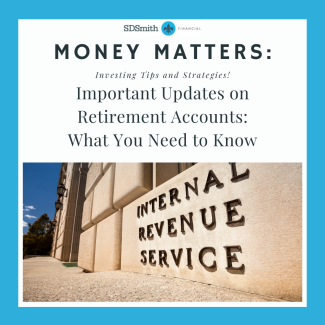
Important Updated on Retirement Accounts: What You Need to Know
As the year winds down, it’s time to review the latest updates regarding Individual Retirement Accounts (IRAs) and other retirement plans. The SECURE Act 2.0, passed in December 2022, introduces significant changes that could impact how you save for retirement. Here are the key highlights:
1. Catch-Up Contributions Get a Boost
Starting in 2024, individuals over 50 will enjoy increased catch-up contributions to their employer retirement plans (like 401(k)s and 403(b)s) and individual plans (IRAs and Roth IRAs). Specifically:
- 2024: You can contribute an extra $7,500 to employer plans and an additional $1,000 to IRAs and Roth IRAs.
- 2025: For those aged 60 to 63, you’ll have the opportunity to contribute even more—either $10,000 or 150% of the 2024 catch-up limit, adjusted for inflation. This means you could contribute an additional $11,250 to your qualified employer retirement plan! Stay tuned for the IRS's official announcements in November.
2. Automatic Enrollment for New Employees
Are you starting a new job in 2025? If so, your employer may automatically enroll you in their retirement plan. Here’s how it works:
- Auto-Enrollment Rate: A default contribution of 3% of your salary will be automatically deducted from your paycheck, unless you choose to opt out.
- Annual Increases: This rate will increase by 1% each year until it reaches a minimum of 10%. If you don’t opt out, the contributions can cap at 15%.
This means you could be saving for your future without lifting a finger!
3. New Rules for Inherited IRAs
If you’re the beneficiary of an IRA (and not a spouse), be aware of the new rules regarding Required Minimum Distributions (RMDs):
- 10-Year Rule: You must fully deplete the account within 10 years, eliminating the previously popular Stretch IRA strategy.
- Penalties: You’ll need to take minimum distributions each year, or face a 25% penalty on any missed withdrawals. However, this penalty can be waived or reduced if you take the right steps promptly.
As we look ahead to 2025 and beyond, more changes to retirement plans may be on the horizon. If you’re curious about how these updates might affect your investment strategy, let’s schedule a call to discuss!

